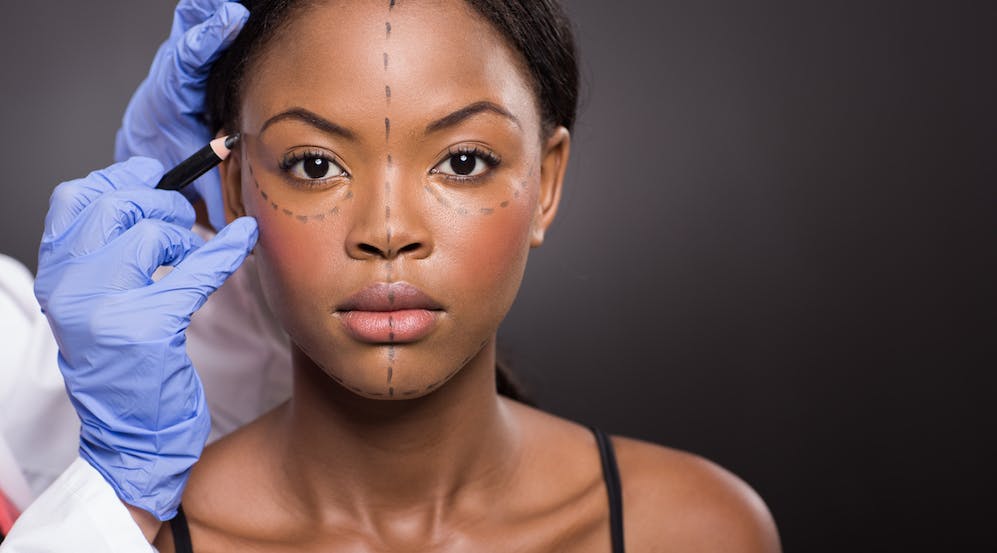31% of Brits Would Consider Cosmetic Surgery, Research Finds
updated on Mar 21, 2018

Surgery may seem like an extreme move in terms of the beauty game, but according to the latest research from Mintel, more than 50% of women and 39% of men aged 18 to 34 would consider a cosmetic procedure, all in the name of beauty
Sounds like a lot, right?
Well, according to Jack Duckett, Senior Consumer Lifestyles Analyst at Mintel, us Brits are actually more happy with our appearance than ever before.
He said “Brits are generally happy with their appearance, presenting a crucial challenge for an industry that is centred on helping people to change how they look.”
“However, there is scope for operators in the cosmetic procedures market to appeal to a wider audience by moving away from the current association with drastic image changes and to instead highlight how procedures can safeguard people’s best features for the future.”
The data shows that experience of surgery is low, but it is the opportunity that gives the market hope. Just 10% of UK adults reported having undergone any of the listed procedures, yet 37% of women and almost a quarter of men would consider cosmetic surgery.
It was the younger group that show most interest, with 52% of women and 39% of men aged 18 to 34 reporting showing an interest in cosmetic procedures.
So, what are the procedures we’re interested in?
According to the data, 14% of women are interested in liposuction, while 11% would consider a tummy tuck. Just 8% would consider a facelift, breast augmentation or eyebrow/eyelid lift. Meanwhile, 7% of men would consider a hair transplant.
On a less invasive note, 43% of Brits would consider non-surgical cosmetic procedures, such as teeth whitening, permanent hair removal and skin treatments.
This comes as Mintel reveals the waistline is Britain’s most disliked body part, with just 41% of all Brits saying they are content with their waistline. In fact, 48% of women reported a dislike for their stomach/waist, compared to 24% of men.
Overall, Women appear less satisfied with their appearance than men.
Other common areas of dissatisfaction include bums, hips and thighs (40%), facial/body hair (28%) and arms, chin or neck (24%). And this dislike for the self is affecting our mental health, too. 16% of women said that over the past year, their stress levels had been impacted by their feelings toward their physical appearance.
Social media influence
In the report, almost half of Brits agreed that social media has made getting non-surgical procedures more commonplace. Not only that, but 46% agreed that non-surgical procedures are becoming much more a part of everyday beauty routines, while 44% believe these procedures are more affordable now, and so are more accessible.

Is social media to blame?
“Our research shows that women are much more likely to be unhappy with areas of their appearance than men, reflecting the high level of pressure many women feel to look a certain way” says Jack.
“Much of this pressure comes from the advertising industry, with the continued emphasis on photoshopped models promoting unachievable aesthetic goals. But there can be no doubt that social media is also playing an important role in exacerbating many women’s self-image doubts.”
“Indeed, while photo editing and filtering tools available on social media have allowed women to perfect their online appearance, for many, this has only made them more self-conscious.”
Why are people having these procedures?
According to Mintel, of those who have had a surgical or non-surgical cosmetic procedure, 41% said it was to look better, while 33% said it was to feel more confident. 27% said it was to feel more comfortable.
While according to Jack, we’re relatively happy with our appearance as a nation, clearly there is still some way to go. While the number of surgical procedures being had is going down, interest in non-invasive surgical procedures is on the up. We are still very much on the focus of ‘fixing’ the things we aren’t happy with, when perhaps what we need to do, is change the way society sees these parts. Why should they need fixing? Why are there parts of our bodies we wish to change?
Instead of focusing on the things we dislike about ourselves, comparing ourselves to others - be it friends and family, or those we follow online - perhaps we need to focus on the things we do love about ourselves and embracing our bodies for who we are.
Each of us may be different, but we’re all beautiful. As a society, we need to remember that.

